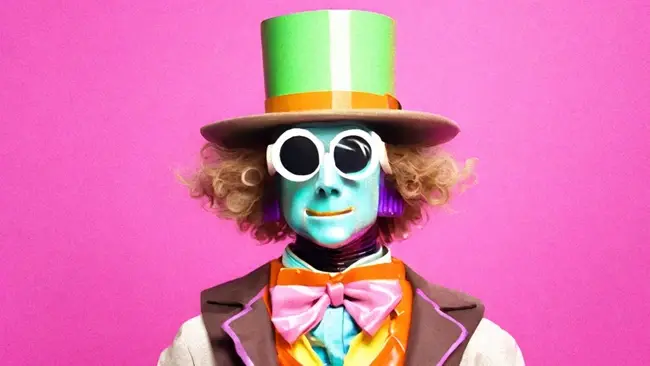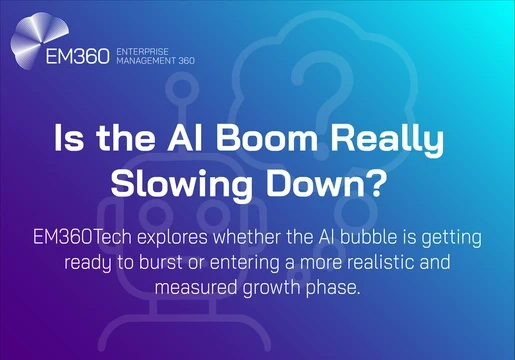An event based on Wonka and the Chocolate Factory has made international headlines this week after the promised ‘world of imagination’ turned into an AI-convoluted disaster.
“Wonka’s Chocolate Experience” in Glasgow, Scotland, was promoted by its organisers with elaborate AI-generated images including giant candy displays, chocolate rivers, and elaborate light displays.
But on arrival, families were greeted by a barely decorated, grey warehouse with a small printed AI background, a disappointing bouncy castle, and actors scaring children with strange, AI-generated characters and confusing one-liners.
"In my eyes, I thought it was going to be some kind of light show with actors. I felt it was going to have sweets and they were talking about a chocolate river," mother Paula Graham told the Sun. "But it was a big warehouse with some props in it and some sheets."
"The actual experience took two minutes to walk through because there was nothing there. When we arrived so many people had complained that they shut it down," she added. "You couldn't even call it an event - it was terrible."
The disappointing “ Wonka Experience” quickly went viral, with those taken in by the misleading AI promotion mobilized for refunds and press coverage this week griping and joking about the candy-coated catastrophe.
But while the story has now become an internet meme, the reality behind the event’s failure boils down to an increasingly concerning problem within the AI space – AI abuse.

‘AI Abuse’
Despite the experience costing a hefty £35 ($45), attendance was still incredibly high, with hundreds of unsuspecting families falling for the event’s fall advertising. If we are to look at the event’s website, it’s easy to see why.
Marketing for the event heavily relied on AI-generated visuals that showcased a vibrant and immersive chocolate wonderland, similar to Wonka's factory.
These visuals, however, were far removed from the reality of the event, creating unrealistic expectations among attendees, particularly parents who purchased tickets for their children.
The official website for the event is still up, and worth browsing, as it highlights exactly what happens when people use AI to generate images and text without bothering to edit what it spits out.
The AI-generated imagery is riddled with unsettling “ AI hallucinations,” and the writing is filled with errors, badly written sentences, and false promises.

"Experience captivating live performances featuring charming characters singing original catchy tunes,” read one advertisement for the event on the House of Illuminati’s website.
“Marvel at extraordinary props, oversized lollipops, and a paradise of sweet treats. This event guarantees an immersive and delightful entertainment experience suitable for ages 3+ years old," according to the event website.”
Read: What are AI Deepfakes and Why are They Dangerous?
House of Illuminati – the company behind this AI-generated site – is yet to admit to what extent it used AI to market its event. But it’s important to note that the company appears to be made up of a single employee.
Billy Coull, who seems to be the sole owner of the House of Illuminati, is one of several companies he has registered.
The House of Illuminati website, like the Chocolate Experience website, is packed with AI-generated art advertising “unparalleled immersive experiences” such as “Mystique Galas” and “Enchanted Retreats.”
The descriptions of the company and its supposed events are themselves almost certainly written by an AI chatbot, according to an analysis by the detection tool GPTZero. The text on the Chocolate Experience page is also likely entirely AI-written.
Coull the AI conman
Following the Coull has taken steps to scrub various social accounts, taking down both a LinkedIn profile and a YouTube channel where it appears he presented himself as something of a business guru and life coach.
His personal site also deleted, touted several dubious academic degrees and said he worked as a “consultant” for a brand called Empowerity, which is now defunct. Neither has he pulled down his Instagram account, which contains only a few posts hyping independently published books that he is selling on Amazon.
so these people used AI images of a Wonka themed immersive experience and got dozens of adults to bring their children to a sketch warehouse and pay £40 each? Is nobody scared? 🥴 pic.twitter.com/860Gc5fRuk
— energy understander (@etherealdeen) February 29, 2024
The 16 books on Coull’s Amazon author page were all published in the summer of 2023 — some of them on the very same day – making it likely that the books were AI-generated.
The synopsis for each book is most certainly AI-generated, according to GPTZero analysis, and so is the text between the covers, as one irate reviewer has complained.
Coull even used AI to write his own author bio, which declares him a “rising star in the literary world” who “weaves spellbinding tales that delve into the mysterious realms of fictional thrillers and gripping conspiracies.”
AI Gibberish
In the days following the disastrous Wonka event, some of the actors hired for the event have been speaking out with their suspicions that AI played a role in devising the chaotic script.
Paul Connell, an actor hired to play Wonka at the event in Glasgow, Scotland, told the Independent the script provided was "15 pages of AI-generated gibberish" and required him and his character to say "mad things” as part of the event.
"The bit that got me was where I had to say, 'There is a man we don't know his name. We know him as the Unknown. This Unknown is an evil chocolate maker who lives in the walls," Connell told the newspaper.

Kirsty Paterson, who was hired to play an Oompa-Loompa at the event, also suspected the script might have had a helping hand from AI. "They kept going on about how you could just improvise" Paterson told Vulture. "I kind of thought it was AI-generated, but by this point, I'd signed the contract."
Jenny Fogarty, another actor hired for the event, told the Daily Mail she and her partner thought AI had written the content after they read the bizarrely written stage directions.
It would not be the first time that AI has been used for creating writing. Writers in Hollywood were striking for months last year in part due to the threat of AI replacing their jobs with writers as Hollywood studios make use of the technology.
The move came as the Screen Actors Guild-American Federation of Television and Radio Artists announced it would be supporting the strike in Hollywood. The dual strikes are Hollywood’s most widespread halt in work in over six decades.
The Hollywood strikes are part of a larger ethical debate surrounding the rise of generative AI and its threat to the creative industries.







Comments ( 0 )